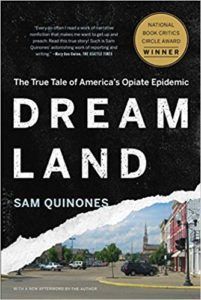
7 Ways Libraries Are Combatting the Opioid Crisis
As the death toll from the U.S. opioid epidemic continues to rise, public and private institutions are seeking to help in whatever way they can. Libraries are no exception. As trusted, non-partisan organizations, public libraries have a unique role in spreading information. But some have gone further than sharing information about opioids, to play a more active role in public health.
To be fair, there’s limited formal evaluation of the impact of these kinds of programs. They’re controversial in some quarters. And it’s not clear whether substance-affected people are being involved in this library programming, which would benefit everyone.
But overall, anti-opioid library programming appears to be an important way of increasing inclusion, spreading awareness, and even saving lives. Drawing on a recent report by library cooperative OCLC, Public Libraries Respond to the Opioid Crisis with Their Communities, here are seven of the ways libraries are combatting the opioid crisis.

Unsurprisingly, they’re stocking books about opioids. Sam Quinones’s Dreamland: The True Tale of America’s Opiate Epidemic is one that comes up again and again.
They’re providing spaces for the safe disposal of unneeded prescription drugs. Ohio’s Twinsburg Public Library partners with an anti–substance abuse coalition to supply free Deterra bags. A person places surplus medicines in one of these portable pouches, fills it with water, and seals it. The bag’s activated carbon then renders the drugs unusable. Similarly, other libraries provide information on drop-off boxes where people can dispose of unused medicines in a safe and environmentally sound way.
They’re organizing informational events, including movie screenings, art exhibitions, and author talks.
They’re stocking naloxone, an antidote to opioid overdoses. And they’re training staff and members of the public on how to use it. Libraries in New Orleans provide bystander response training that includes information on opioids as well as naloxone administration. To give another example, over 1,300 naloxone kits have been given out in Salt Lake County. This has had the knock-on effect of facilitating other kinds of partnership with the Utah Department of Public Safety, which now works with the library system to distribute gun locks at the Salt Lake County Library.
They’re connecting opioid users to social services. This includes providing space for community and public health organizations to discuss their services with the public; partnering to provide peer navigators; and facilitating courses in substance use recovery and post-incarceration reintegration.
They’re running educational campaigns. This can reach many kinds of library visitors. For example, the Salt Lake County Library created a display showing what opioids look like and explaining how quickly physical dependency can begin. Children expressed curiosity about the “candy” in the images. This created an opportunity for staff to explain to kids the difference between candy and harmful objects that shouldn’t go into their mouths.
They’re trying to reduce stigma. Some library visitors are uncomfortable with people with substance abuse problems being admitted to libraries at all, let alone being welcomed with information and support. Some visitors express concern about safety and this use of public funding. The concerns have led some library administrators to deemphasize the opioid focus of certain programming, reframing it more broadly as a health project. The misgivings of certain library users show that opioid-related education at libraries should target not just people directly affected. Other community members may have limited knowledge of the subject, and libraries can try to reduce their preconceptions.
As a speaker commented in a recent webinar related to the OCLC project, “despite news media stories about libraries and opioids, libraries are still largely overlooked when it comes to organizing citywide responses to this issue.” While any such measures need to be context-specific, it’s very valuable to learn about the ideas and lessons of different libraries.


